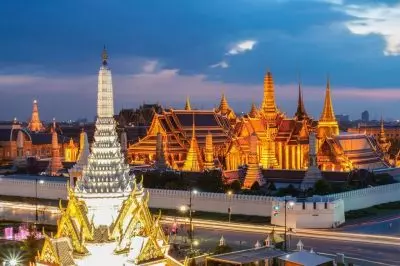 Most forms of gambling are presently prohibited in Thailand but a group of smaller political parties is pushing to lift the ban. The group calls for amendments to the country’s gambling legislation that would legalize both brick-and-mortar and remote casino gambling. The draft amendment submitted by the group proposes the development of four landbased casinos in Thailand.
Most forms of gambling are presently prohibited in Thailand but a group of smaller political parties is pushing to lift the ban. The group calls for amendments to the country’s gambling legislation that would legalize both brick-and-mortar and remote casino gambling. The draft amendment submitted by the group proposes the development of four landbased casinos in Thailand.
According to the local daily Bangkok Post, the group is led by the business tycoon and politician Chatchawal Kong-udom of the Thai Local Power Party. It comprises the entire Thai Local Power Party, along with twenty other politicians of different party affiliations.
The minor parties proposed building landbased casinos in each of the country’s four major tourist regions, arguing that regulated casino gaming could give a much-needed revenue boost to the local economy. If approved, the proposed amendments to the Thailand Gambling Act would also tax and regulate interactive gambling operators while prosecuting remote businesses that illegally target players from the country.
Chatchawal, who leads the Thai Local Power Party, is confident legal gaming could facilitate the recovery of Thailand’s economy as the country struggles with substantial national debt. The submission of the draft amendments comes in the wake of the recent launch of a study that explores the prospects of introducing regulated casino resorts.
The study in question gained the approval of the House of Representatives, which established a dedicated committee to supervise it. The purpose of said committee is to establish how citizens feel about the amendments and estimate whether launching regulated casino resorts would be profitable. The committee is expected to deliver a report with its findings later this month.
Thailand Is One of Three ASEAN Countries to Still Prohibit Casinos
 It is yet unclear how many landbased casinos could launch if the proposed amendments come to pass. However, it is suggested Thailand’s capital Bangkok could be the primary location for the development of casino-resort projects. The Pattaya and Phuket areas are also considered suitable to host casino resorts since they are highly attractive to tourists.
It is yet unclear how many landbased casinos could launch if the proposed amendments come to pass. However, it is suggested Thailand’s capital Bangkok could be the primary location for the development of casino-resort projects. The Pattaya and Phuket areas are also considered suitable to host casino resorts since they are highly attractive to tourists.
Analysts have suggested the Nevada-based casino and hospitality company Las Vegas Sands is likely to become Thailand’s first regulated landbased operator. These suggestions sound feasible as representatives of the gambling giant itself recently stated it has entered into talks with an unnamed major country in Asia.
According to Robert Goldstein, Chief Executive Officer of Las Vegas Sands, the company is looking to build a new integrated casino resort similar to Singapore’s Marina Bay Sands. Goldstein did not specify the exact location planned for the project, however.
Thailand is among the few member states of the Association of Southeast Asian Nations (ASEAN) that still prohibit casino gambling, the other two being Brunei and Indonesia. The country has legal wagering on horse races and state-operated lotteries but casinos remain illegal for the time being. The prohibition does not prevent locals from engaging in illicit gambling as nearly half of Thailand’s adult population wagers with unauthorized operators.